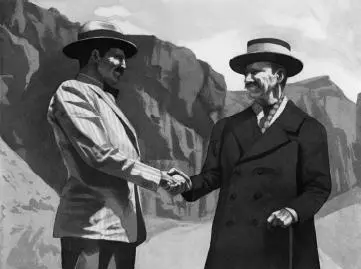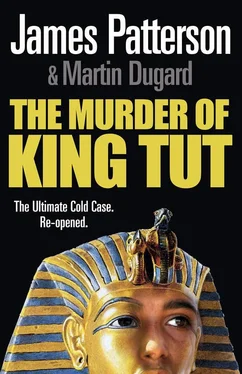
Howard Carter and Lord Carnarvon in the Valley of the Kings. Theirs was one of history’s most successful partnerships.
It was good to have a job. So Carter lit a cigarette and gave the order for his men to start digging.
Lord Carnarvon stood at his side, dressed smartly in a suit and skimmer.
Their relationship would clearly be different than the ones Carter had enjoyed with Lord Amherst and even Theodore Davis. The old days of Carter being stubborn to make a point were over. He was a hired man now and would not be treated as a member of the family.
But he didn’t much care. He had plans in his head, plans to bring professionalism and accountability to Carnarvon’s ragtag style of digging. Wealthy patrons were hard to come by. With Carter’s expertise and Carnarvon’s money, there was a chance they might actually find something important.
And someday, if this all worked out, they would move into the Valley of the Kings and do some real digging, for real treasure.
Amarna
1330 BC
THERE HAD BEEN no public ceremony and no special words from the high priests to mark the moment of their marriage union.
Ankhesenpaaten had simply moved her belongings to Tut’s side of the palace, where their father had once laid his head.
That had been three years ago. They had slept in separate rooms since then but had also become closer friends. Now, on the day they had put Nefertiti in her tomb, Tut would rule alone.
Ankhesenpaaten fumbled with her gauzy white gown as she and Tut prepared to share a bed for the first time. He wasn’t yet a teenager, like his sister and bride, who was a few years older, but Tut had begun to physically develop into a man, and this wasn’t lost on his wife.
It was time they produced an heir-or at least, given their ages, began practicing.
Tut untied the cumbersome, false pharaoh beard from around his head and laid it on a bedside table. Nefertiti had coached them both, in individual discussions, and Tut thought he had a good understanding of how it all worked. But he had never visited a harem, as the royal scribe Aye seemed to do each afternoon after lunch, and what was about to transpire was unnatural and awkward to him.
Ankhesenpaaten turned her back discreetly as she slipped her dress off her shoulders. Tut watched the fabric drop down past her narrow hips and land silently on the floor.
Ankhesenpaaten covered her budding breasts with one hand as she turned to pull back the bedcovers, then slid between the warm sheets. He could smell the perfumed oils she used on her body and hair.
“Now you, Pharaoh.”
Tut felt butterflies in his stomach and was unnerved at the thought of shedding his clothes right there with Ankhe in the room, especially since his own longings were on full display.
“Did you ever feast as much as today?” he asked somewhat randomly, referring to the whirlwind of revelry surrounding Nefertiti’s funeral. All the priests of Aten had feted her. Aye had been there too, and Tut had noticed that the royal vizier drank quite heavily while huddling in the corner with Tut’s generals.
“I don’t think I’ve ever seen that much food in my life,” Ankhesenpaaten agreed.
“I wish Mother could have been there.”
“Now you can make your claim to the throne. No one can deny you.”
“Yes,” Tut said softly, feeling for the first time the crushing weight of being the pharaoh of all of Egypt. It pressed down on him like a block of limestone.
“We are alone, Tut,” Ankhesenpaaten whispered, realizing a different sort of burden. “Just the two of us in this difficult and complicated world. Not a parent to guide us. Just us.”
“It’s scary when you say it like that.”
“Yes. But Tut, let’s promise that we will always look out for each other and protect each other from those who would do us harm.”
“I promise, Ankhesenpaaten. I will never let anyone harm you.”
“I promise too.”
The bedroom was still then, uncomfortably so. The warm desert air flowed in through the open window, and Tut could smell the faint and wonderfully familiar musk of the Nile.
Ankhesenpaaten took a deep breath, and then she pulled back the sheets, unafraid to show herself to her husband.
In their many years together, Tut had never seen his half sister naked, and now he gasped at the realization that she was exceptionally shapely and beautiful.
“Take off your kilt, Tut,” she said.
The pharaoh did as he was told. And he was beautiful too.
Thebes
1326 BC
THE NIGHTS OF PASSION were but a bittersweet memory to Ankhesenpaaten now. Still the young queen had never been more excited-or frightened.
“I’m late,” she whispered, rolling over in bed and propping her chin on Tut’s chest. She could feel her breasts pressing against his ribs, as she reached down to touch between his legs.
“How often have I heard that?” Tut replied, doing his best to sound pharaoh-like, instead of utterly smitten.
“Tut,” Ankhesenpaaten whispered, mounting him. “I am three months late. We are going to have a baby. I’m certain of it. So tonight, let’s celebrate.”
Tut gazed up at her and supported her body by clasping her breasts. She leaned forward and began rocking slowly, all the while caressing his face with her hands.
“Think of a name,” she said softly, closing her eyes as pleasure coursed through her body.
“Nefertiti,” he said.
“What if it’s a boy?”
“Nefertiti.” Tut laughed.
“What about Tuthmosis? Or Amenhotep? Those are royal names.”
Ankhesenpaaten moaned then; names no longer seemed important to her.
She was usually very quiet in bed, but on that morning she was sure she woke all of Thebes as she climaxed. The sensation seemed to go on and on, a wave of pleasure that rolled through her once-barren body just as surely as the Nile flowed through Egypt ’s desert sands.
She looked down at Tut and watched his shoulders tense as ecstasy contorted his beautiful face. Then he let out a most unpharaoh-like cry.
“We are going to have a baby,” repeated Ankhe-senpaaten.
Tut’s Palace
1326 BC
THAT HAD BEEN five months ago.
Now, perched atop a royal birthing stool, Ankhesenpaaten clenched her abdominal muscles and pushed one last time-at least she prayed this was the last time. As Tut stood by her side, clasping Ankhe’s hand, their child finally joined them, delivered into the waiting hands of the royal physician.
It was stillborn.
The poor baby was obviously deformed, with one shoulder much higher than the other and a spine curved sideways, and just as obviously dead.
“Summon the royal magician,” the doctor said emphatically, speaking to a courtesan standing just behind Ankhesenpaaten.
The royal magician would be charged with healing whatever illness had caused the queen to miscarry, burning hot coals on the floor between her legs as she remained on the low stool, allowing the smoke to enter her womb and clean out all impurities.
“Is it a boy or a girl?” Ankhesenpaaten asked in a weak voice. She felt like crying but held back the tears. She had always been a strong girl.
“I do not think it matters, Queen,” said the doctor.
“Boy or girl?” barked Tut in a voice that indicated he would not brook such insolence.
The physician sat up straight, remembering his place. “A girl, Majesty.”
Ankhesenpaaten held out her arms. The umbilical cord connecting mother and daughter was still intact, and now the queen pulled her dead child to her bosom and sobbed in anguish.
Читать дальше













